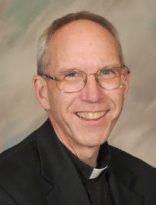Why is the church opposed to legalizing assisted suicide when we are all going to die anyway? Shouldn’t we have the freedom to choose when?

I have only met one person from Broken Bow, Oklahoma: Father Joseph Propps. In his early 50s, Father Propps was on the seminary faculty at the North American College in Rome. He was known as a wise spiritual mentor, a ruthless racquetball opponent, a staunch supporter of the Missionaries of Charity in Rome, and a succinctly eloquent preacher. One Tuesday noon, he spoke on this Psalm passage, urging us to make our days count rather than just counting the days.
Within a year of that homily, Father Joe died.
Did he perhaps know that day that his health was failing? He gave no such indication, by word or action, and you would not guess it when the racquetball zinged by your ear. But he seemed to me to have attained the Psalmist’s vision, numbering his days aright in wisdom by a life of service, prayer and charity. As the Minnesota Legislature and many other states continue to deliberate on legalizing assisted suicide, the concept of “numbering our days aright” speaks a vital message to our culture.
[perfectpullquote align=”right” bordertop=”false” cite=”” link=”” color=”” class=”” size=”16″] “Teach us to number our days aright, that we may gain wisdom of heart.” Psalm 90:12 [/perfectpullquote]It acknowledges that life here is finite, and making our days count is both an opportunity and a responsibility. Yet it also reminds us that our lives are given to us in stewardship; openness to God’s wisdom as it is communicated to us both in revealed truth and in human experience is necessary to count “aright.”
Catholic teaching obliges us to use ordinary means to preserve our life and health, that we might make our days count in fulfilling our particular responsibilities and relationships in life with God, family, career and community. That same teaching permits us to recognize the limits of interventions in serious illness, and forgo extraordinary means to extend life when such means are ineffective or excessively burdensome to the sick person.
Medical technology, drugs, surgeries, therapies and other procedures are meant to be our servants, not our masters; forgoing extraordinary means does not indicate a lack of faith or disrespect for life, but an acceptance of the finiteness of our numbered days here, because we trust in the endless life that is made possible for us by Christ’s own death, that we might also share in his resurrection.
St. John Paul II states at the beginning of “Evangelium Vitae” (“The Gospel of Life”): “It is precisely this supernatural calling which highlights the relative character of each individual’s earthly life. After all, life on earth is not an ‘ultimate’ but a ‘penultimate’ reality; even so, it remains a sacred reality entrusted to us, to be preserved with a sense of responsibility and brought to perfection in love and in the gift of ourselves to God and to our brothers and sisters” (n. 2).
To say that our life here is a penultimate reality means that this is not the last or only phase of our existence, but rather the next to last: a future awaits beyond the boundary of death. But what that future will be for each of us lies in our freedom. And living that freedom well requires that we learn from God how to number our days aright.
This conviction means that we cannot choose the length of our lives here independently from our responsibilities to God and to others. Our stewardship does not authorize us intentionally to end our lives, or the life of another, at will. We can accept death, as did the martyrs, but we may not seek it or cause it, as assisted suicide or euthanasia would do.
Numbering our days aright, as Father Joe demonstrated especially in his work with the Missionaries of Charity, also means supporting our brothers and sisters as they bear a share in the cross. Those whose lives are marked with struggle, suffering and dependency teach us that the value of human life arises not from accomplishment and ability, but from our dignity as children of God, made in the divine image. Those words are so easily spoken as an abstract idea, but it can demand much of us to live them out in concrete moments. Yet doing so ennobles us and calls forth a greatness that we may not have realized was within our spirits.
May God teach us wisdom, that we may number our days aright — not simply counting the days, but making each day count for God and for one another until the Lord declares we are ready for the ultimate reality.
Father Tom Knoblach is consultant for health care ethics for the Diocese of St. Cloud. He also is pastor of Holy Spirit, St. Anthony and St. John Cantius parishes in St. Cloud.






















